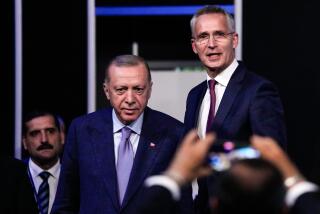Stationing Turks in Iraq Could Endanger Region
- Share via
The Bush administration is making a mistake by seeking Turkish soldiers for duty in Iraq. Confronted by a guerrilla war -- waged by Saddam Hussein loyalists and Islamic militants from outside Iraq -- and a U.S. Congress and public increasingly skeptical about the logic behind the war and its costs, the White House understandably wants to reduce the toll in blood and treasure being paid by the United States. But recruiting Turkey to help stabilize Iraq will create more problems than it solves.
This is the second time that the Bush administration has knocked on Turkey’s door for help with Iraq. Before the war, the U.S. sought Ankara’s permission to deploy 60,000 American troops on Turkish soil to create a second front. Despite intense lobbying by the Turkish government, Turkey’s Parliament spurned the request, creating a low point in Turkish-American relations.
Ever since, Prime Minister Recep Tayyip Erdogan has been eager to repair the damage. Erdogan was determined not to blow a second opportunity and, because his Justice and Development Party now controls nearly two-thirds of the seats in Parliament, he won parliamentary approval easily. Turkey is slated to send 5,000 to 10,000 troops to Iraq for a year.
For Ankara, stationing troops in Iraq does more than mend its frayed relationship with the U.S. It gives Turkey a military presence in Iraq to handle what the Turks consider their worst-case scenario: the fragmentation of Iraq and the rise from the rubble of an Iraqi Kurdish state that aggravates Turkey’s Kurdish problem.
True, Turkish peacekeepers are to be stationed in western and central Iraq, away from the Iraqi Kurdish areas, where, to put it mildly, Turkey’s motives are suspect. But if Iraq should implode, Turkish forces will be on location and able to enter northern Iraq with ease.
The logic behind Turkey’s actions is clear and compelling -- on political and strategic grounds. The same cannot be said of the Bush administration’s position. It is based on dubious calculations and assumptions, and it promises to do more harm than good.
To begin with, soliciting Turkish peacekeepers will increase already strong anti-American feelings in Turkey, an important ally. Turkish public opinion solidly opposed the war, and the sentiments are no different when it comes to providing troops to salvage what Turks see as a failing and hazardous American mission.
The people most unhappy about the prospect of a Turkish military deployment in Iraq are Iraq’s Kurds. Of all the ethnic groups in Iraq, none has been more supportive of U.S. policy in Iraq -- and none is more leery of Turkey. The Kurds know that Turkey has been unwilling even to accept a future federal Iraq where Kurds enjoy substantial autonomy. Nor do they doubt that they will be up against the Turkish military if Iraq comes apart and they move to establish their own state.
Even if that dramatic denouement does not materialize -- it is not a foregone conclusion -- the Kurds fear that the Turkish military will traverse their region to supply its contingent in Iraq and that pro-Ankara Iraqi Turkmen, who are at odds with the Kurds, will gain confidence from the Turkish presence.
It’s a bad day when so impressive an Iraqi Kurdish leader as Barham Salih, prime minister of the regional government controlled by the Patriotic Union of Kurdistan, publicly questions the U.S. turn to Turkey. Another top Kurdish leader, Hoshyar Zebari, Iraq’s acting foreign minister, has been equally blunt. Washington’s Iraqi partners may have little leverage, but it is hardly sensible to create doubts in the people whose cooperation is critical to the success of the administration’s Iraq policy.
The Bush administration’s hopes that Turkish troops will increase Iraq’s stability rest on a flimsy foundation. Iraq was part of the Turkish Ottoman Empire, and its neighbors will view a Turkish military foothold as the beginning of a gambit aimed at extending Ankara’s influence at their expense. The Iranians in particular will step up their covert operations among Iraq’s Shiite population, and that will draw others in. With its political future already up for grabs, Iraq can ill afford a free-for-all among its covetous neighbors.
The White House’s hopes that Turkey’s decision to send troops to Iraq will spur other Muslim states to follow suit are also almost certainly misplaced. Pakistan is one of the countries that the administration hopes will be influenced by the Turkish deployment, but its president, Pervez Musharraf, has said his troops will serve only as part of a U.N. mandate -- an arrangement that appears quite unlikely. The real reason for Musharraf’s caution is that the idea of sending troops to Iraq is anathema to most Pakistanis, particularly to the Islamist parties that are a major force in Pakistan’s politics. They routinely attack Musharraf for being Washington’s cat’s paw in Afghanistan, and he cannot afford to give them more political ammunition.
Nor are any other Muslim states of consequence willing to step up to the plate. Turkey has vital interests in Iraq and is an exception. It is willing to accept the hazards involved. Yet as American soldiers come under daily attack, few other Muslim states will follow its lead. With Iraq in turmoil and widespread hostility in the Muslim world toward the U.S. military presence in Iraq, why would they take the risk?
The Bush administration’s Turkish solution is a non-solution.
More to Read
Sign up for Essential California
The most important California stories and recommendations in your inbox every morning.
You may occasionally receive promotional content from the Los Angeles Times.













